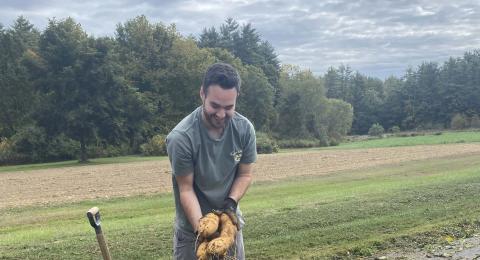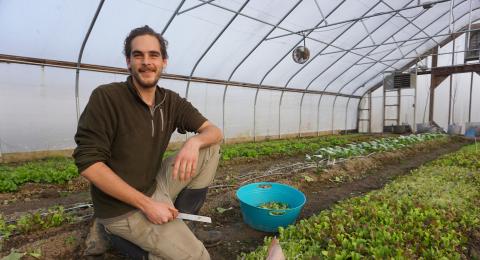An Agriculture and Food Systems minor at UNH equips you with a deeper understanding of the complex relationships between food production, sustainability and global food security. This minor complements majors in environmental science, nutrition, or business by providing insights into sustainable agriculture, food policy and the challenges of feeding a growing population. It appeals to students passionate about sustainable food systems, food justice and the environmental impact of agriculture.
What is agriculture and food systems?
Agriculture and food systems is a broad field integrating the natural sciences, social sciences and business skills, plus much more. Agriculture and food systems are key to solving many of the major challenges facing the world, such as producing food to meet the needs of ever-growing populations while conserving land, water and other natural resources. An understanding of these challenges and potential solutions can enhance any career.
Why minor in agriculture and food systems at UNH?
By minoring in agriculture and food systems, you’ll gain an understanding of several strategies to sustainably manage soil, nutrient, water, and genetic resources. You’ll develop in-depth knowledge by taking additional coursework focused on agricultural production, management, and/or policy. You’ll also have an opportunity to gain hands-on experience in cutting-edge research taking place at our top-notch agricultural research facilities.
Potential career areas
- Agricultural business management Agricultural research
- Agricultural services and support
- Farm-to-table restaurant management
- Education and outreachGrant writing
- Greenhouse management
- Policymaking
- Production of food and fiber
Curriculum & Requirements
Encompassing a broad mixture of the natural sciences, social sciences, and business skills, agriculture and food systems is an interdisciplinary field that lies at the center of many of the major challenges facing the world, such as producing food to meet the needs of an ever-growing population while conserving natural resources and promoting human wellness. An understanding of these challenges and potential solutions can enhance any career.
The required coursework for this minor provides an introduction to sustainable and organic agriculture practices, including an array of strategies to sustainably manage soil, nutrient, water, and genetic resources. Students gain more in-depth knowledge of agriculture and food systems by selecting from a diverse array of electives focused on production systems, management, and/or policy.
Undergraduates in any major field of study (except current majors) may minor in Agriculture and Food Systems.
Academic policies related to Minors.
| Code | Title | Credits |
|---|---|---|
| Required Courses | ||
| AGFS 405 | Sustainable Agriculture and Food Production | 4 |
| Electives | ||
| Select 16 credits from the following courses: 1 | 16 | |
AAS 432 | Introduction to Forage and Grassland Management | |
AGFS 403 | Green Thumb Workshop | |
AGFS 410 | A Taste of the Tropics | |
AGFS 421 | Introductory Horticulture | |
AGFS 502 | Agroecology | |
AGFS 601 | Fruit Crop Production | |
AGFS 620 | Food Systems & Community Resilience | |
AGFS 632 | Urban Agriculture | |
AGFS 651 | Plant Pathology | |
AGFS 670 | Systems Thinking: Land Use Capability and Sustainability in Aotearoa New Zealand | |
AGFS 671 | Agroecology and Sustainable Land Management in Aotearoa New Zealand | |
AGFS 672 | Pathways to Sustainable Agriculture and Food Systems in Aotearoa New Zealand | |
AGFS 673 | Agricultural Production and Business Practice in Aotearoa New Zealand | |
AGFS 679 | Food Production Field Experience I | |
AGFS 680 | Food Production Field Experience II | |
AGFS 689W | Greenhouse Management and Operation | |
AGFS 690 | Agricultural and Food Policy | |
AGFS 733W | Advanced Topics in Agriculture and Food Systems | |
AGFS 750 | Food System Solutions; Increasing Sustainability and Equity | |
AGFS 760W | Integrated Pest Management | |
ANSC 421 | Introduction to Animal Science | |
ANSC 750 | Collaborative Farm Design and Development | |
NR 501 | Studio Soils | |
NUTR 405 | Food and Society | |
NUTR 730 | From Seed to Sea: Examining Sustainable Food Systems | |
ZOOL 610 | Principles of Aquaculture | |
| Total Credits | 20 | |
- 1
Electives - 16 credits of elective coursework, 8 credits must be at the 600/700 level, selected from the courses listed.
Students are encouraged to discuss their intent to minor with the minor advisor as early as possible, typically no later than the end of the junior year. Not all classes are offered every year.





















